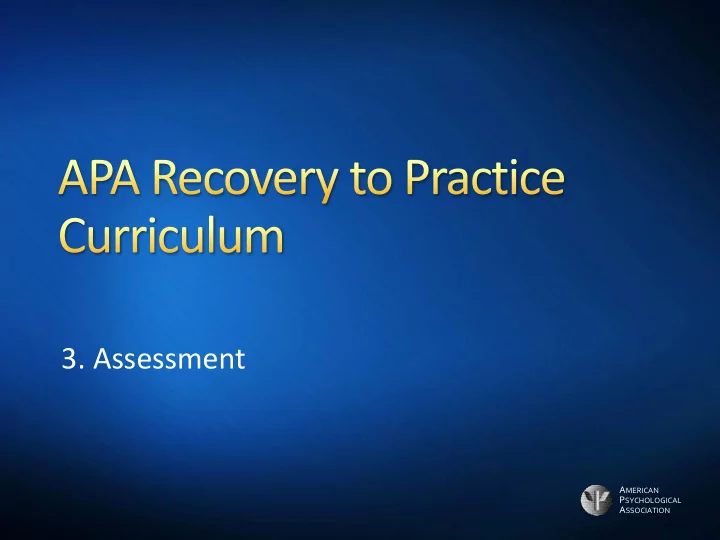

3. Assessment A MERICAN P SYCHOLOGICAL A SSOCIATION
“The cornerstone of any good treatment plan is a thorough assessment of a person’s strengths and weaknesses” (Silverstein, 2000) A MERICAN P SYCHOLOGICAL A SSOCIATION
“ … every individual, no matter how severe the person’s illness might be, has the capacity to continue to learn and develop.” (Davidson, et al., 2008) Skills Cultural knowledge Talents Family stories Personal virtues & traits Spirituality Interpersonal skills Knowledge gained from adversities, occupational or parenting roles A MERICAN P SYCHOLOGICAL A SSOCIATION
Traditional Clinical Strengths Based Ecological Assessments Assessments Psychiatric diagnosis Cultural knowledge Problematic symptoms and Family stories behaviors Spirituality Failures in social, educational Knowledge gained from & vocational pursuits adversities, occupational or Difficulties in life parenting roles A MERICAN P SYCHOLOGICAL A SSOCIATION
Components of a Strengths Based, Ecological & Functional Assessment Continual process of seeking information Information gathered from several life domains Cultural influences are incorporated Focused on positive aspects of a person’s life Develops skills and resources needed to facilitate recovery A MERICAN P SYCHOLOGICAL A SSOCIATION
Strengths Based Assessment: Approaches each person from the standpoint of determining: Capabilities Accomplishments Potential Considers positive factors in the person’s surrounding environment: Natural support network (family strengths, community supports, social service system network) Each person has the potential for future accomplishments that will facilitate continuing to attain the life he or she wishes to achieve A MERICAN P SYCHOLOGICAL A SSOCIATION
Some Questions to Ask: What do you call your challenge and what caused it? What are you most proud of in your life? What is one thing you would NOT change about yourself? What are the most important things to you when deciding where to live? With what cultural group(s) do you identify? What kinds of things have you liked learning about? What are your hopes and dreams for the future? Have you ever been treated inappropriately or in ways that were harmful to you? What are the things that matter most to you? A MERICAN P SYCHOLOGICAL A SSOCIATION
Citation for this Module: American Psychological Association & Jansen, M. A. (2014). Assessment. Reframing Psychology for the Emerging Health Care Environment: Recovery Curriculum for People with Serious Mental Illnesses and Behavioral Health Disorders. Washington, DC: American Psychological Association. www.apa.org/pi/rtp Citation for the full Curriculum: American Psychological Association & Jansen, M. A. (2014). Reframing Psychology for the Emerging Health Care Environment: Recovery Curriculum for People with Serious Mental Illnesses and Behavioral Health Disorders. Washington, DC: American Psychological Association. mjansen@bayviewbehavioral.org or jansenm@shaw.ca August, 2014 A MERICAN P SYCHOLOGICAL A SSOCIATION
Recommend
More recommend